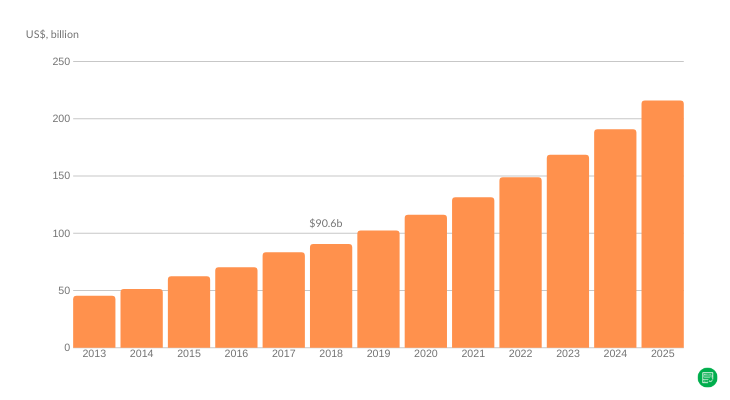Does hosting affect your search engine optimization? Is web hosting essential to search engine optimization?
Many people wonder how web hosting affects their search engine optimization efforts, especially when it comes to choosing the right web host and ensuring your website will perform well in search engines.
Here’s what you need to know about web hosting and search engine optimization so you can rest assured that your website will remain an effective marketing tool long into the future.
Do you know? As per the latest report, the web hosting industry market will reach approx. $216 billion by 2025.

In this blog post, we’ll look at the impact of web hosting on SEO in more detail and show how you can start using it to improve your site’s rankings today.
Highlights of Contents
What is Web Hosting?
To understand if hosting affects SEO, you need to know what web hosting is. Web hosting refers to any service that allows you to host files on an Internet server from which you can then access those files from anywhere in the world with an Internet connection.
The terms web host and website host are often used interchangeably, but they’re not the same. When most people think of website hosting, they’re thinking of a place that houses your website’s code on their servers.
This service has been provided by most Internet Service Providers (ISPs) over the last several years. For example, when you purchase domain names from GoDaddy, it gives you web hosting in addition to your domain registration service for free.
Also Read: Why SEO plays an important role in business growth?
Why Is Web Hosting Important?
It’s essential to select a web hosting provider that fits your needs and your website. If you try to go cheap and skimp on quality, you could be putting your site at risk; poor hosting can lead to downtime (which we all know is not suitable for SEO), hacked sites, security breaches, slow load times—the list goes on.
Moreover, If your site is slow or takes a long time to load, it could indicate that your website hosting isn’t up to par. Slow speeds can directly impact your search engine optimization (SEO) efforts as people tend not to go back after a bad experience.
The lesson? When choosing web hosting, you must keep speed in mind if you want your site to perform well both for users and on search engines.
Significant Features of SEO Friendly Website Hosting
There are several key features of SEO- friendly website hosting that you need to keep in mind. Some of the critical ones are the following.
1. Website Security
What are you doing to protect your website from a security breach? Hackers can steal customer data or shut down your website.
It would help if you take every measure to protect your site and its visitors, and web hosting plays a significant role in that process. You probably won’t have much control over specific hosting features, but choosing one that emphasizes security will help ensure you aren’t compromising your site with unreliable tech support or insufficient software.
If there are many host options available, look for one that has gone through an accreditation process or is endorsed by some tech authority (like PCMag).
2. Server Location
In most cases, a user’s location will have no impact on SEO. However, one big exception to that rule is the location of your web hosting. The optimal location for your hosting depends mainly on what type of site you’re building and what you hope to achieve with it.
For instance, if your goal is to target customers in your geographic area, you might want to consider hosting your site locally.
While, if you’re hoping to attract customers from all over (or even abroad), you may be better off with a host located outside of your immediate area. Like everything else in search engine optimization (SEO), it’s essential to test different options and find what works best for your specific needs.
3. Website Loading Speed
Website speed is also something you should factor into your decision because it improves user experience. A page with a quick loading speed is more likely to earn more traffic and have higher rankings in Google’s search results than pages that are slow to load.
Speed has become such an essential factor, and experts say that the site’s overall speed can affect its ranking by 25%. Plus, A study has shown that 53% of online shoppers will abandon an e-commerce website if it takes longer than 3 seconds to load.
Source: https://www.officialbryangrey.com/website-load-time-statistics/
As a business owner, ensuring your site loads within time isn’t just suitable for your users—it can also help you boost sales and improve your website’s visibility on Google.
4. Automating Backups
Whether you’re an individual user or run a large organization, one of your biggest concerns is how to protect all of your data. When you host with a hosting web service, the automated system must handle all of that for you.
The backup servers must save daily copies of your site and safely store them off-site so that if there’s ever a problem with your hosting, you can get everything back up and running quickly and easily. They should be able to restore previous versions so that you don’t lose any work at all.
What Does Web Hosting Have To Do With SEO
The better your hosting is, generally speaking, the more reliable your site will be. If it’s down a lot, that sends a clear message to search engines (and your users) that you’re not serious about what you’re doing.
So, instead of figuring out how to build links or go after higher search rankings, try improving your Web hosting first—and then move on from there if necessary. A highly trafficked site with terrible hosting can never achieve high search rankings because it becomes too difficult for users to access it.
Choosing The Right Web Host
In general, purchasing web hosting is a good idea, but you need to be careful about who you choose to host your site. Many hosting providers offer low-cost web hosting or even free web hosting to get more customers.
However, these options often come with hidden costs and limited features that could wind up costing you more money or, worse, negatively impacting your search engine optimization (SEO). Because of these potential issues, you must do your research when choosing a web host for your website.
You need to read the reviews and ask people for recommendations before deciding where to host your website.
Summing Up!
Web hosting is a simple part of creating a website that most business owners and startups ignore. But by taking time to do your research before purchasing web hosting, you’ll be doing yourself and your website a great favor.
You may also choose to use a Web hosting service to host your website. Web hosting can bring several benefits, including significant savings over time and greater security for your information.
However, it would be best to do your research when choosing an online hosting company to ensure that they can offer everything you need in terms of speed and storage space.
Find the top 100 SEO companies to boost the website ranking on SERP.
Frequently Asked Questions
How does web hosting affect SEO?
Web hosting refers to the process of storing and delivering files related to a website. Your website must be hosted on a server that is connected to the Internet to be accessed publicly.
Moreover, web hosting can affect SEO primarily by improving your site’s loading speed. An improved loading speed will result in a higher likelihood for search engines to rank your content or business, as they can offer quicker access to what you’re offering.
What is web hosting in SEO?
Web hosting is a service in SEO that allows you to store your domain on their servers. It is a physical device that stores website files so web browsers can access them over the Internet. It may also include databases, email accounts, and statistics.
Web hosting will allow your site to be online and accessible to others across the world. Without it, other people can not visit your page or read any articles you might post on your page.
Does poor hosting affect SEO?
Yes. Web hosting is primarily the foundation of any website, and if a site visitor can’t load your page in an acceptable amount of time, they’re going to leave and search for another site that will be faster. Problems with slow web speed also lead to problems with client conversion, which affects ROI.
Which hosting is best for SEO?
Web hosting depends on the size and needs of your site. Ideally, you want to look for a hosting company that offers CDN services so that when users from geographically distant locations attempt to load content, they have an easier time having it delivered locally.
There are four main types of web hosting:
- Shared hosting
Shared hosting is the most elementary type of web hosting. It’s cost-effective and ideal for small or entry-level websites. As you might have guessed by its name, other sites will share a server with yours on shared hosting – it means that your website can enjoy resources as well.
- VPS (virtual private server) hosting
VPS is one step ahead of shared hosting, as with a virtual private server, your website will still be sharing a single server with other websites. However, the several websites you’ll be sharing with it are lower.
- Cloud hosting
Cloud hosting is similar to a hybrid version of VPS but more cost-effective. Cloud hosts come with multiple remote servers, and if one malfunctions or has an issue, the other takes over.
- Dedicated hosting
Dedicated servers are considered the best choice in web hosting. They are completely customizable and offer top-notch features like high uptime rates, fast loading speeds, and increased security for your business’ data.
